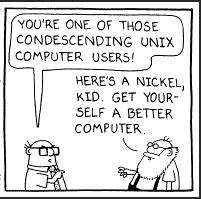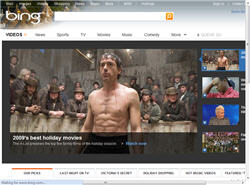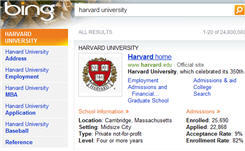 This morning, Microsoft employees demonstrated a long list of enhancements to their Bing search engine at a press event at the company’s San Francisco office.
This morning, Microsoft employees demonstrated a long list of enhancements to their Bing search engine at a press event at the company’s San Francisco office.
That office is next door to the city’s newest, splashiest, most expensive shopping center, the Westfield, and after sitting through the Bing demo, I’m sure Microsoft parked its employees next to a mall on purpose. Many new Bing improvements, such as maps with interactive driving directions, are mere catch-up to what Google has done for years. But others, driven by heavy market research aimed at finding ways Google is missing the mark, show how very much the kind of people who use the Internet has changed since a few years ago.
In short, the people who use search engines today are nothing like the people who build them. Online, the normals have finally displaced the geeks.
Here are three ways the new audience’s demands differ from the early adopters.
AI Weekly
The must-read newsletter for AI and Big Data industry written by Khari Johnson, Kyle Wiggers, and Seth Colaner.
Included with VentureBeat Insider and VentureBeat VIP memberships.
 Don’t give me a link to the answer. Just give me the answer. The Internet used to be populated by precocious people who liked math, science, and technology for its own sake. If they had a question, they preferred to be shown where and how to get the answer for themselves. Today, Bing’s target audience is much broader and much less intellectual. Google’s stated mission, “to organize the world’s information,” sounds tiring or even intimidating. Bing is being marketed as a replacement for long, 30-minute-plus Google search sessions that some people love and most people don’t. The slogan on Microsoft’s PowerPoint slides today was, “Bing is the faster way to more informed decisions.” I’m not convinced yet that Bing is better or faster at decision-making, but it’s an appealing promise.
Don’t give me a link to the answer. Just give me the answer. The Internet used to be populated by precocious people who liked math, science, and technology for its own sake. If they had a question, they preferred to be shown where and how to get the answer for themselves. Today, Bing’s target audience is much broader and much less intellectual. Google’s stated mission, “to organize the world’s information,” sounds tiring or even intimidating. Bing is being marketed as a replacement for long, 30-minute-plus Google search sessions that some people love and most people don’t. The slogan on Microsoft’s PowerPoint slides today was, “Bing is the faster way to more informed decisions.” I’m not convinced yet that Bing is better or faster at decision-making, but it’s an appealing promise. Pictures are better than words. Visual Search is one of the Bing crew’s favorite features to lead with in presentations. They don’t bother trying to convince anyone that their top ten Web results are more relevant, more all-inclusive, or fresher than Google’s. Instead, Bing uses every opportunity possible to put lots of images and video on the page. A search for Joe Biden on Google today is topped by news items in which Biden comments on the latest Beltway scandal. Bing, instead, returns no news, but a half dozen photos of Joe above his Wikipedia entry. Tech workers raised on command-line interfaces and plain text email wince whenever their browsers spew images onto the screen. Once the authority figures on the Internet, they’re now a forgotten minority of cranky old men.
Pictures are better than words. Visual Search is one of the Bing crew’s favorite features to lead with in presentations. They don’t bother trying to convince anyone that their top ten Web results are more relevant, more all-inclusive, or fresher than Google’s. Instead, Bing uses every opportunity possible to put lots of images and video on the page. A search for Joe Biden on Google today is topped by news items in which Biden comments on the latest Beltway scandal. Bing, instead, returns no news, but a half dozen photos of Joe above his Wikipedia entry. Tech workers raised on command-line interfaces and plain text email wince whenever their browsers spew images onto the screen. Once the authority figures on the Internet, they’re now a forgotten minority of cranky old men. I’m totally fine with getting search results from a Microsoft database of multimedia celebrity flash cards instead of from the entire Internet, if it tells me what I want to know. A large number of searches are quick-reference requests for things like the weather and celebrity photos and stats. Bing meets this market-researched need by crafting what its developers call “cards” for frequently searched people, places and things. These short lists of a picture plus basic stats on the person, place or thing are displayed above the traditional Web links. According to the Bing folks, these canned answers test better than the links. I believe them, because Yahoo’s search team gave reporters a demo earlier this year where they said their tests came back the same: Most people like having a canned answer atop the results, as long as they can trust that it’s correct. What’s the top reason most people hit a search engine? Bing researchers found that it’s to decide what to wear, based on the weather outside. You don’t need t0 search every page on the Internet to figure that out.
I’m totally fine with getting search results from a Microsoft database of multimedia celebrity flash cards instead of from the entire Internet, if it tells me what I want to know. A large number of searches are quick-reference requests for things like the weather and celebrity photos and stats. Bing meets this market-researched need by crafting what its developers call “cards” for frequently searched people, places and things. These short lists of a picture plus basic stats on the person, place or thing are displayed above the traditional Web links. According to the Bing folks, these canned answers test better than the links. I believe them, because Yahoo’s search team gave reporters a demo earlier this year where they said their tests came back the same: Most people like having a canned answer atop the results, as long as they can trust that it’s correct. What’s the top reason most people hit a search engine? Bing researchers found that it’s to decide what to wear, based on the weather outside. You don’t need t0 search every page on the Internet to figure that out.
Google is groping its way toward this same change in what its audience wants, but you can almost feel the intellectual hesitation. I have to admit, I’m not sure I want Google to become more like Bing. I’d rather have my choice. But Bing hasn’t grabbed one-tenth of the world’s search engine traffic in just a few months by luck, or by advertising. They did it by figuring out correctly what people actually want.
VentureBeat's mission is to be a digital town square for technical decision-makers to gain knowledge about transformative enterprise technology and transact. Learn More